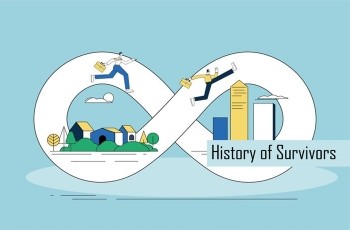シンクタンクからの眼 2024年11月11日
市場とは、生き残った者たちの物語 The Market is the History of Survivors

今回は『賢者コラム Wisdom Columns』として、平田ひでお先生の寄稿文をご紹介いたします。
市場とは、生き残った者たちの物語
私たちは市場に囲まれて生きている。スーパーマーケットで商品を選び、スマートフォンを使ってオンラインショッピングをし、馴染みのあるブランドの飲み物を手に取る。これらはあまりにも自然な日常の一部となっているため、私たちはある重要な事実を見落としがちだ。それは、私たちが目にするすべての製品や市場の仕組みが、数え切れないほどの挑戦と失敗、そして勝利の積み重ねによって築かれてきたということだ。
市場とは、不便さが生んだ革新であるに違いない。人類の革新は、常に不便さを解消しようとする試みから始まった。スーパーマーケットが登場する前の店舗の形態は、今とは大きく異なっていた。まるで閉架式図書館のように、顧客が欲しい商品を店員に伝えると、店員が倉庫から商品を取り出して提供する仕組みだった。しかし、来店客が増えると、店員が不足し、待ち時間が長くなるという問題が生じた。
この状況を打破したのが、画期的な発想の転換だった。倉庫に保管していた商品を陳列棚に並べ、顧客が自分で選んでレジで会計を済ませるという方法だ。この仕組みにより、店員の数を削減でき、消費者はより自由に買い物を楽しめるようになった。スーパーマーケットの誕生によって、私たちはカートを押しながら商品を選ぶことが当たり前になったのだ。
このように、革新とはこれまで試みられなかった方法への挑戦であり、その過程では必然的に失敗も伴う。現在の自動車の形態も、数多くの試行錯誤を経て確立されたものであり、スマートフォンも同様に進化してきた。革新の道は決して平坦ではない。
寂しいことではあるが、市場に生き残るのは勝者だけだ。私たちが日々使っている製品やサービスは、激しい競争を勝ち抜いた者たちの努力と挑戦の結晶である。どれほど優れた技術を持っていても、コストが高すぎたり、安全性や環境面での課題を克服できなければ、市場から淘汰される。そして何より恐ろしいのは、品質が高く価格も手頃でありながら、消費者の求めるものではなかったために埋もれてしまう商品だ。市場に残れなかったものは、やがて人々の記憶からも静かに消えていく。
新しい市場を開拓する際には、従来の考え方にとらわれないことが重要だ。Appleのスティーブ・ジョブズは、初代iPhoneを発表する際、市場調査を大反対した。なぜなら、人々はまだ「スマートフォン」という概念を知らなかったため、彼らに意見を求めても意味がないと考えたからだ。彼の直感は正しく、iPhoneは世界を変え、私たちはタッチスクリーンを使うことを当たり前とする時代へと移行した。
しかし、革新を追い求めるあまり、逆に失敗を招くこともある。その代表的な例が、1980年代に起こったコカ・コーラの「New Coke」事件である。当時、競争相手であるペプシは「ペプシ・チャレンジ」と呼ばれるマーケティングキャンペーンを実施し、消費者に目隠しをした状態でペプシとコカ・コーラを飲み比べてもらった。その結果、より甘いペプシの方が好まれるという市場調査のデータが得られた。
この結果を受けて、コカ・コーラは危機感を抱き、従来よりも甘さを増した「New Coke」を発売した。しかし、これは大きな失敗だった。消費者は一口飲むと甘い味を好むものの、一缶を飲み切るとその甘さに飽きてしまったのだ。結局、コカ・コーラは元の味に戻すことを決め、その際に「Coca-Cola Classic」として再発売することになった。消費者が求めていたのは「新しい味」ではなく、「慣れ親しんだ味」だったのだ。
ここで壮大なことを言うと、市場とは、人類文明の進化の証なのだ。「New Coke」事件はマーケティングの教科書に残る有名な事例だが、市場から消えた製品やサービスの多くは、人々の記憶にすら残らずに消え去る。市場は結局、生き残った者たちの記録である。現在存在するすべての製品やサービスは、消費者の支持を得て競争に勝ち抜いたものであり、それゆえに今も市場として人類の文明を進めている。
市場とは誰かが計画的に設計したものではない。経済学者フリードリヒ・ハイエク(F. A. Hayek)は、文明とは特定の天才や独裁者によって生み出されたものではなく、多くの人々の経験と試行錯誤の積み重ねによって発展してきたものだと述べている。市場も同じく、さまざまな挑戦が行われ、あるものは成功し、あるものは失敗しながら、競争を経て進化してきたのだ。
このように、私たちは市場を通じて、絶えず変化する世界を目の当たりにしている。その裏には、数え切れない挑戦と革新、そして消えていった数多くの失敗がある。市場経済は、誰かが単独で設計したものではなく、多くの人々が関わり、築き上げてきた生きた人々の歴史なのだ。だからこそ、私たちが当たり前のように享受しているモノやサービスの裏側には、激しい生存競争の物語があるのだ。
(平田ひでお、アジア経済文化研究所顧問、National University Kangwon名誉教授)
『賢者コラム Wisdom Columns』The Market is the History of Survivors
We live surrounded by markets and products. We select goods in supermarkets, shop online using smartphones, and pick up familiar brand-name beverages. These acts have become such an integral part of our daily lives that we often overlook an important fact: every product we see and every market structure we experience is the result of countless challenges, failures, and ultimately, victories.
Human innovation has always begun as an attempt to overcome inconvenience. Before the emergence of supermarkets, stores operated quite differently from today. They resembled closed-stack libraries, where customers would tell clerks what they wanted, and the clerks would retrieve the items from the stockroom. However, as the number of customers increased, there were not enough clerks to serve them efficiently, leading to long wait times.
A revolutionary shift in thinking changed this system. Instead of keeping goods in a stockroom, stores began displaying them on shelves, allowing customers to pick out items themselves and pay at the checkout counter. This innovation reduced the need for clerks and gave consumers greater shopping freedom. The birth of the supermarket made it commonplace for us to push a cart and select items at our leisure.
Such breakthroughs represent challenges to existing norms, and failures are an inevitable part of the process. The modern automobile, for instance, took shape through a long series of trial and error. Similarly, smartphones have evolved through multiple innovations. The path of progress is never smooth.
The products and services we use daily are the results of those who have won in competitive markets. No matter how advanced a technology may be, if it is too costly or fails to resolve safety and environmental concerns, it will be eliminated from the market. And those that fail to survive soon fade from our memory.
When pioneering new markets, it is essential to break free from conventional thinking. When Steve Jobs launched the first iPhone, he rejected market research. Since people at the time were unfamiliar with the concept of a smartphone, their opinions would have been meaningless. His intuition proved correct, and the iPhone revolutionized the world, making touchscreens a ubiquitous part of modern life.
However, the relentless pursuit of innovation can sometimes lead to failure. A notable example is Coca-Cola’s “New Coke” incident in the 1980s. At the time, Pepsi conducted a marketing campaign called the “Pepsi Challenge”, in which blindfolded consumers tasted both Pepsi and Coca-Cola. The results showed that many preferred the sweeter taste of Pepsi.
Perceiving this as a threat, Coca-Cola decided to launch a new, sweeter version called “New Coke”. However, this move turned out to be a major failure. While consumers enjoyed the initial sweetness in a single sip, they found it overwhelming when drinking an entire can. Eventually, Coca-Cola reverted to its original formula, rebranding it as “Coca-Cola Classic”. Consumers had not been seeking a new taste—they wanted the familiar one they had always loved.
The “New Coke” incident is a famous case study in marketing history, but most failed products and services disappear quietly, forgotten by the public. The market is ultimately a record of the survivors. Every existing product and service has gained consumer support and proven its competitive strength, which is why it remains in the market today.
However, market economies are not systems designed by a single person. The economist Friedrich Hayek argued that civilization was not created by any single genius or dictator but rather evolved through the accumulation of experiences and trial-and-error by many individuals. The same applies to the market. Some innovations succeed, others fail, and through this process of competition, markets continue to evolve.
Through markets, we witness a constantly changing world. Behind this transformation lie countless challenges, innovations, and many forgotten failures. The market economy is not a simple design crafted by one person but a living history shaped by countless individuals. Therefore, should we not remember the fierce survival battles that have unfolded behind the familiar products and services we take for granted?
(Hideo Hirata, Honorary Professor of National University Kangwon, Advisor of Asia Economic and Culture Academy)




